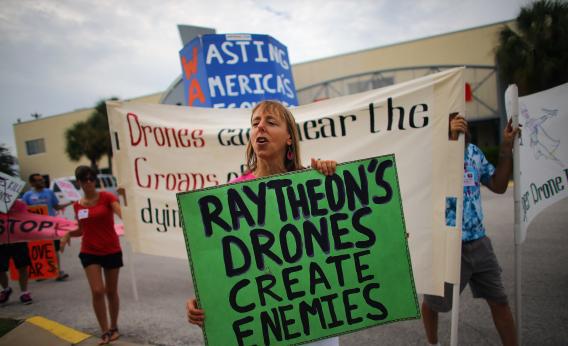According to this video summary of the “Living Under Drones,” the report I mentioned last week, there are people in Pakistan’s Federally Administered Tribal Areas who had not heard of the United States until they saw a drone destroy something. Said people are going to have an unusual take on American culture, because the next thing they’re getting is Code Pink.
Along with thousands of Pakistanis, a few dozen members of the anti-war group plan to take part in a drone-focused protest march led by Imran Khan this weekend, though it’s unclear whether Pakistani authorities will allow this. Yesterday the women and other activists met with the acting ambassador to Pakistan Richard Hoagland, who promised that there would be no drone strikes during the rally. Beyond that, Hoagland seems to have found various ways of saying that the drone program is classified and he can’t talk about it. When someone asked how they could have a discussion about the logic and justification of drone strikes if the CIA would not make any details public, Hoagland said “no comment.”
Interrupting speeches is a political practice of arguable utility, and my sense is that to many on the left, Code Pink is basically the estrogen-fueled equivalent of the drum circle they wish would go away. But it’s not surprising that the people who take pleasure in shouting down speakers are the people who think waltzing into drone country sounds like a good plan. It takes a certain personality type to pay attention to the thing everyone else is effortfully avoiding. In an election year, Code Pink would seem to be poor team players. And ever since Obama took office, they’ve been struggling. “The vast majority of people who were part of the peace movement under Bush have disappeared,” Code Pink founder Medea Benjamin said in May.
Benjamin, who just presented ambassador Hoagland with her book on the subject, wants compensation for the families of civilians killed. The Bureau of Investigative Journalism estimates that there are between 474 and 884 such civilians, of which 176 are children. One imagines that a dollar goes a long way in Waziristan; this does not seem like a strain on American resources. But compensation involves an admission of having exacted harm. And that might still be too much to ask for.
